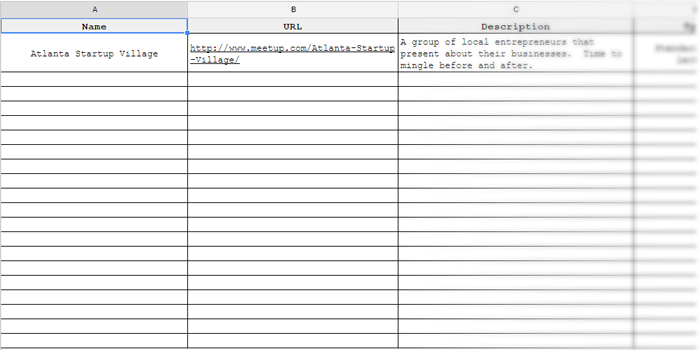Here, we’ll really dig deep into how to find networking events in Atlanta that aren’t completely useless.
Even though most of this input could be applied to any city, we’ve got a bunch of relevant local examples for you to digest.
We’re going to…
- Outline what makes a good event
- Go over the different types of events
- We’ll start finding events
- Finally, I’ll briefly explain my process for vetting events
This is the narrative that gets parroted around business and entrepreneurship communities all across the world:
“Relationships are the be-all end-all of the business world!”
It’s no wonder there’s so many networking events in metropolitan areas!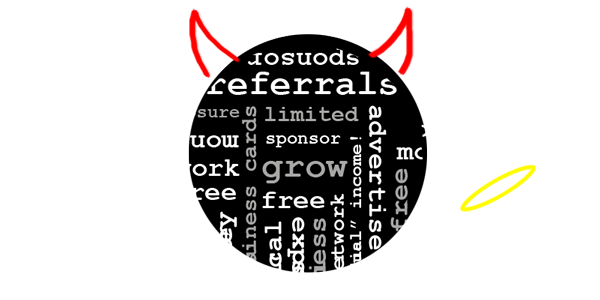
Though as usual, quantity typically wins over quality, and as you’ll soon discover, there is an absurd amount of low quality networking events in Atlanta.
Given that your time as a business owner is extremely valuable, I’m going to show you how quickly to find legitimately valuable and relevant networking events to attend. We’ll use these criteria later when filtering through other local events in Atlanta.
What Makes a “Good” Networking Event?
After attending hundreds of networking events in the past few months, I’ve been able to distill down the criteria for what makes a “good” networking event:
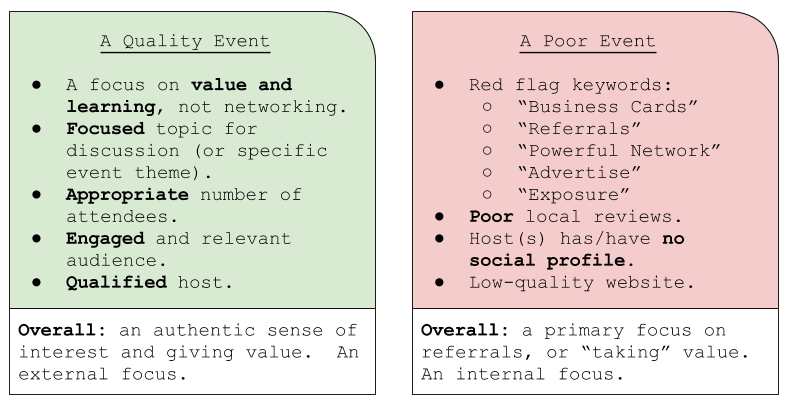
These rules are applied across the board regardless of the event type. Let’s take a look at those while we’re on the topic…
The Types of Events
So now that we know the kinds of events to reach out to, let’s talk about the types of events that exist.
We’re diving into the details here simply because for certain verticals, some events are by nature more useful than others.
Realistically, there are 5 different event types:
As you search for new events, you’ll find these event types (and various combinations of them) in each networking “sector” that we’ll go over in the next section.
First, we’re going to take a deeper look at each event type, and you can decide which ones would be best for your particular industry.
| Conferences & Expos
Typically, you’ll want to attend these if you need to target individuals in a very particular vertical niche. For example, if you’ve developed a solar powered car, you’d want to attend big ticket events like Solar Power International.
Exposure to this hyper-specific type of customer is difficult to do in the local space, so this would be your best bet.
Keep in mind that some of the more general conferences & expos (those focused around small business) will require much more effort in order to be valuable for your company.
Why? You’re casting a wide net, and are therefore competing with all the major brands that are doing the same. Oftentimes, new businesses don’t have the resources to make a splash in these large domains, so you’re better off focusing on a particular subset of people first.
You’ll learn quickly that the more general conferences provide the most value for the presenters there (not so much the attendees), so don’t pass up the opportunity to present if one of them happens to reach out!
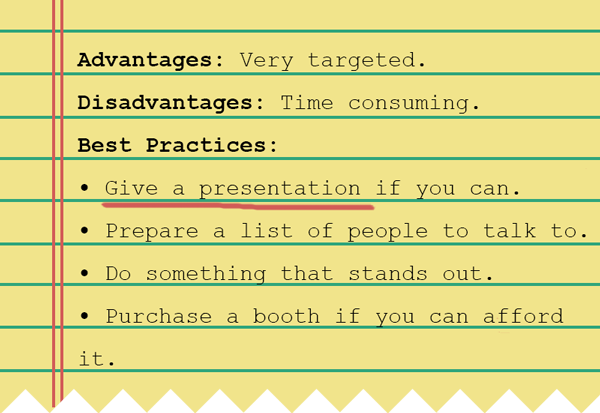
| Standard Mixers
Then, there’s the standard mixer events. These are the types of events that everyone thinks about when they hear the word “networking”. A bunch of business people dressed in suits mingling and sipping on champagne.
These kinds of event are often very powerful when you’re first starting to network, as they let you get your foot in the door in a very passive way. Though the efficacy of these kinds of events lessens as the audience becomes more and more broad.
If you need to form deep connections with your target customer, then you’ll want to consistently be at these events.
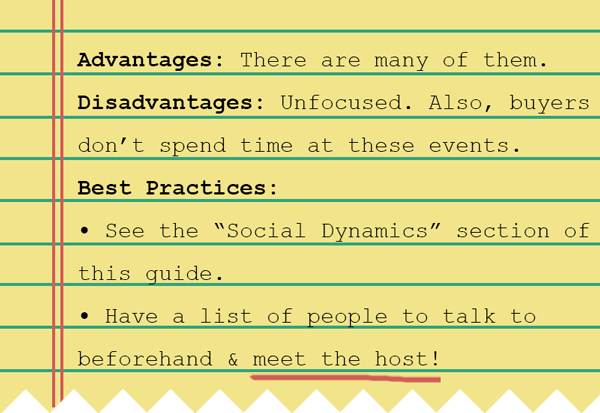
| Lectures
These events are similar to the conferences and expos (and often occur at them), though they happen on a much smaller scale. The format here is that you typically show up and listen to a few presentations on a focused topic.
Lecture events are great for 2 kinds of businesses:
- Any business that’s giving the talk; and
- Businesses that want to be exposed to the population of individuals who are interested in the talks.
And of course, these events will be much more valuable to you if you actually want to hear what the lecturers have to say!
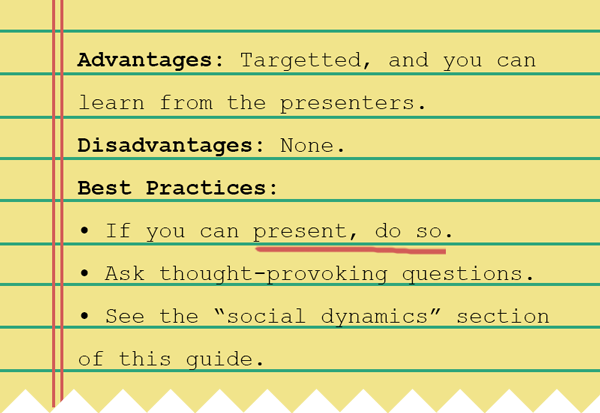
| Dining Events
Humans are social creatures by nature. We bond very well when food is involved, so it only makes sense that these types of events would be common.
Often, they are much more informal (and exclusive), but they are some of the most valuable events you can attend.
Why? Again, the goal is to build trusting relationships with potential partners, customers, and clients: food catalyzes this process.
These are the kinds of events that almost every business owner would benefit from. But how do you get an invite?
Well, you simply have to be in the right place at the right time, talking to the right people who in turn like you. This is one of the primary reasons why I recommend networking exclusively for a month at minimum. As you get better and better you become more and more connected and eventually more valuable events start making themselves visible to you.
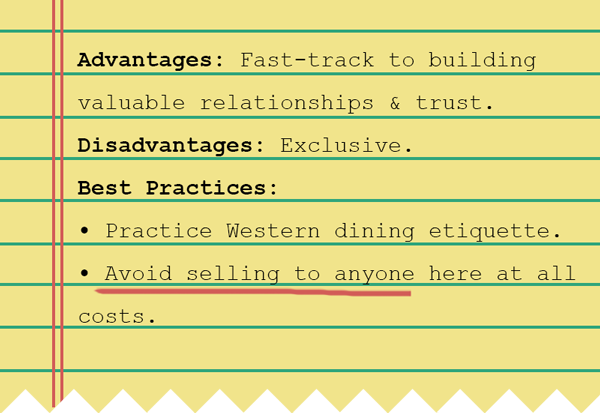
| Referral Engines
Referrals are the holy grail of the service industry. It’s no surprise that events exists solely to promote this mentality.
You’ll run into these types of events sooner rather than later, but I want to stress that they’re not as bad as they seem at first glance.
The primary purpose of referral engine events is (appropriately) to generate referrals for the participating members. So you’ll often find that these events require some sort of consistency in attendance, and usually a paid membership.
Certainly the most popular among these events are the abundant BNI chapters you’ll run into. These chapters focus heavily on generating referrals for members, and have a yearly membership fee.
BNI (and other similar events) are best for individuals who provide B2C local services such as plumbers, landscapers, architects, etc. This is simply because most people will not have a hard time finding people to refer to you in their daily lives.
If you fit one of these roles, then definitely make your way to your local BNI chapter and sign up! Keep in mind though, that not all groups are created equal, so visit a few before you pick one to commit to.
Here’s 2 of the more reputable chapters I visited here in Atlanta:
- The Sandy Springs Perimeter Chapter
- The Virginia Highlands Chapter
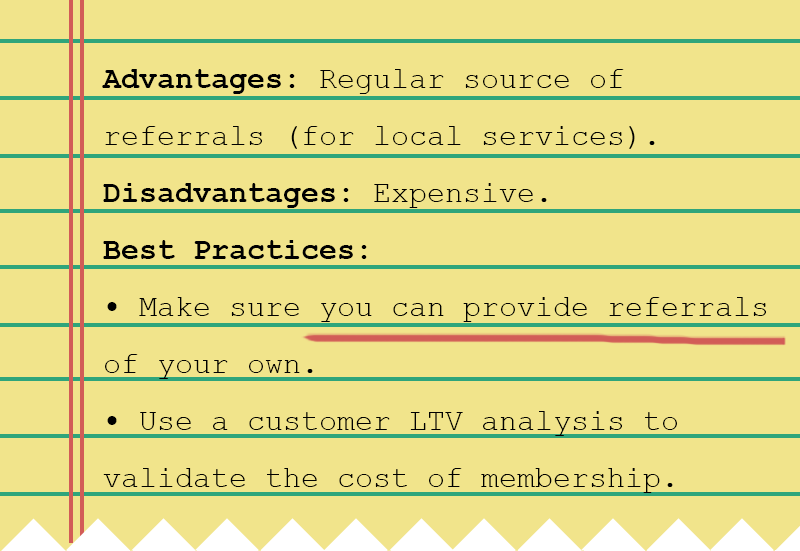
How to Find Networking Events
Now that you have an idea of the types of events you should attend, we need to find some actual events to attend. Here’s the process we’re going to use to vet the events before committing to attendance: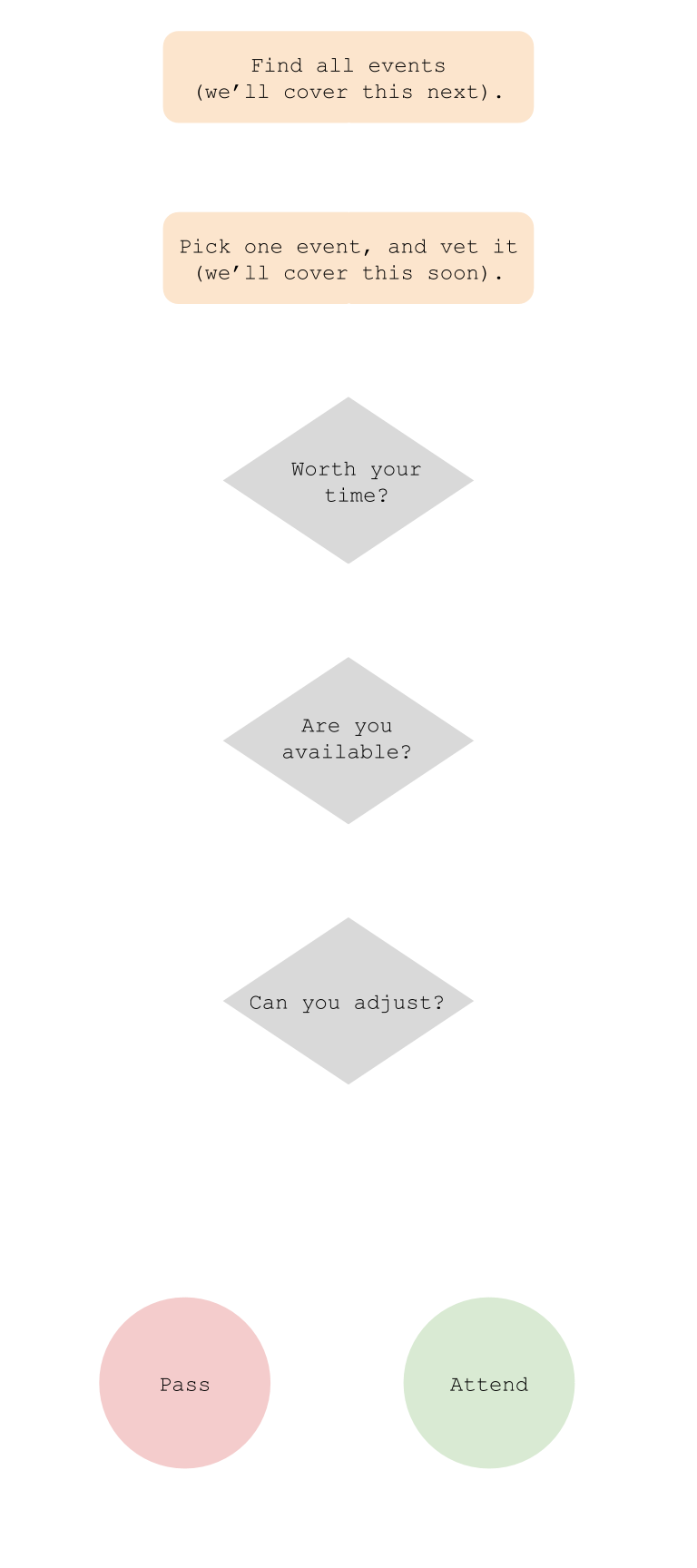 Also, I use the below spreadsheet to keep my event list organized as I go. Download it if you’d like to follow along precisely as I do.
Also, I use the below spreadsheet to keep my event list organized as I go. Download it if you’d like to follow along precisely as I do.
We’re going to tackle the events in this order:
- Easy Targets – the easy to find general networking events.
- Niche Events – the hidden events that are very relevant to your niche.
- Event Aggregators – the events you find through big name aggregators like Eventbrite and Meetup.
- Paid Events – events that require you to invest a little to attend.
- Notable Events – some highly-curated events that I’ve found over the past year here in Atlanta.
- Your Chamber of Commerce – understanding the dynamics of your local chamber and whether or not you should add it to your list.
- Conferences & Expos – finding valuable conferences and expos.
- Events to Avoid – a quick outline of events you should try to avoid.
Finally, keep in mind that for now we’re only going to focus first on getting events on the list, then we’ll go back and vet them for quality.
I hope you’re ready to get your network on – here we go!
| The Easy Targets
We’re just going to find networking events using some simple Google searches, and add them to the events sheet.
Head over to Google and type in the following exact search string:
“networking” atlanta -site:meetup.com -site:eventbrite.com -chamber
This essentially filters out all the common aggregators and any chamber of commerce events, leaving you with the purely local events.
Note: Replace “atlanta” with your city if you’re reading from somewhere else!
This is what shows up when I run the query (as of March 2016):
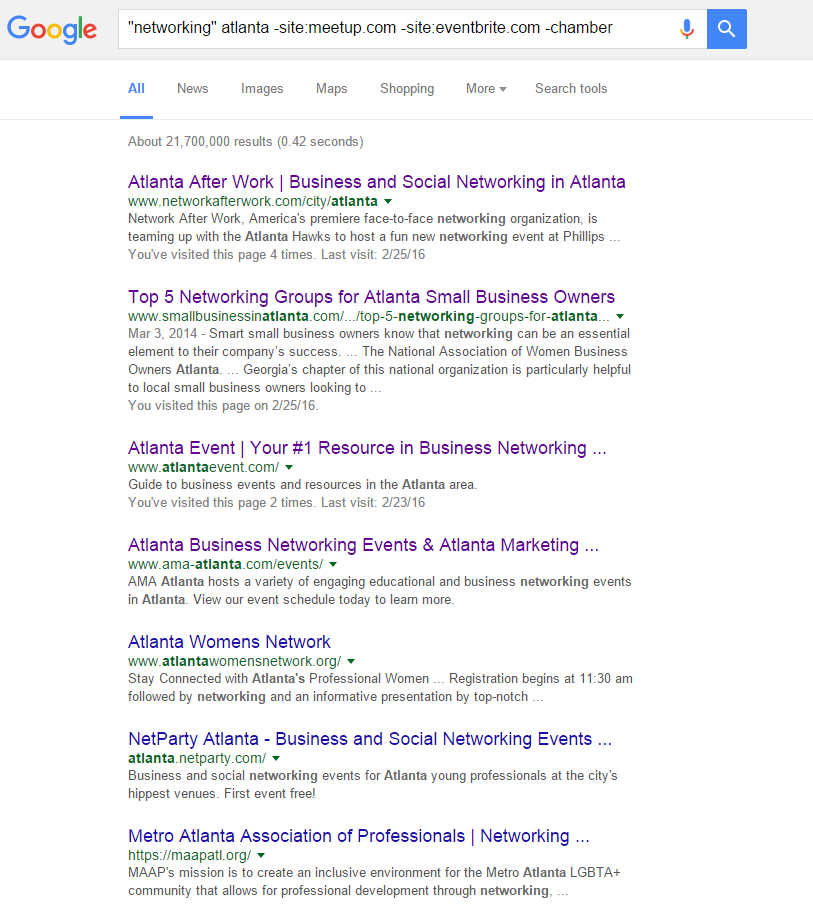
As you can see, there’s quite a buzz in the Atlanta local networking space!
Go through all the links here and add the events you find to the list.
Boom! You’ve got your first 10 events.
| Niche Events
You’ll find that these events are going to yield similar results to the previous group, they’ll just a be a bit more targeted.
Head back over to Google and type in the following search string, replacing the placeholder with your actual niche:
“networking” “[your niche]” atlanta -site:meetup.com -site:eventbrite.com -chamber
For example, if I had a product that would help real estate investors, I would use the following query:
“networking” “real estate” atlanta -site:meetup.com -site:eventbrite.com -chamber
Here’s what that query looks like for me (March 2016):
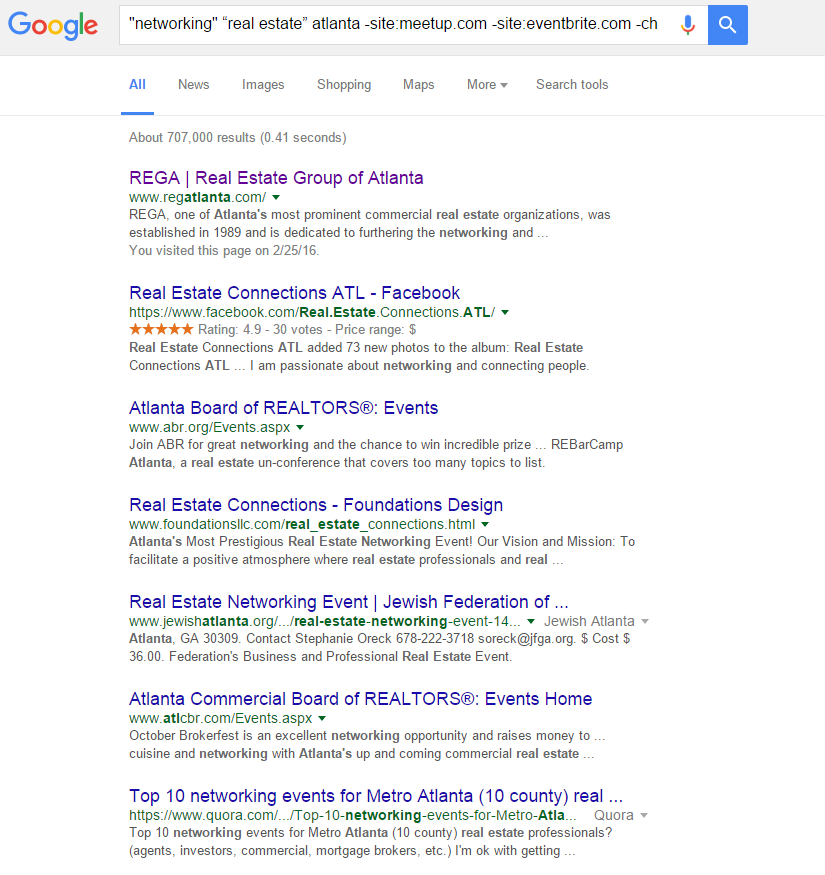
Given that Atlanta is currently booming in the real estate market, I’m not surprised that there’s quite a few smaller event listings here.
Note: that if you have a very specific niche, you won’t get very many events from here (or even any at all). Don’t be afraid to use related keywords too (“health professionals” vs. “dentist”).
It’s likely that this is going to be the source of many really focused events, so be sure to dig in deep and find some to add to your list!
| Event Aggregators
Now, we’ve got the classic event aggregators that we all know and love.
Specifically, we’re going to be looking at Eventbrite and Meetup.com. I’m going to walk you through exactly how to leverage them to find networking events that are relevant.
Using Meetup.com
Meetup is a fantastic source for finding incredibly-targeted and community-reviewed events. It’s worth noting that you’ll really only find recurring events via Meetup, so make sure you enable email notifications.
Here’s how you find events:
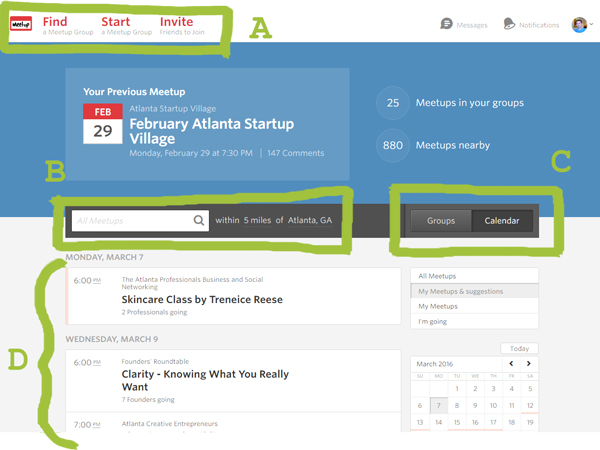
First, let’s take a quick look at the interface:
- A: You can either find new meetups, start your own (we’ll cover this later), or invite others to events you’re attending!
- B: This is where we’re be searching for relevant events.
- C: You can view the events in a calendar or a grouped up with their associated meetup groups.
- D: This is where you’ll see any relevant and upcoming meetup events.

1. Of course the first step is to click the “Find” option in the navigation pane.
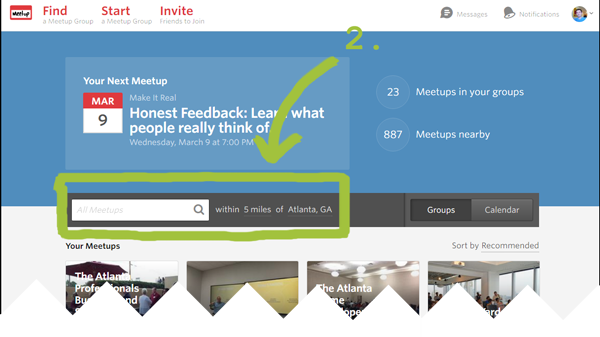
2. Next, make sure that the location is the search bar is set to “Atlanta, GA” (or your preferred location).
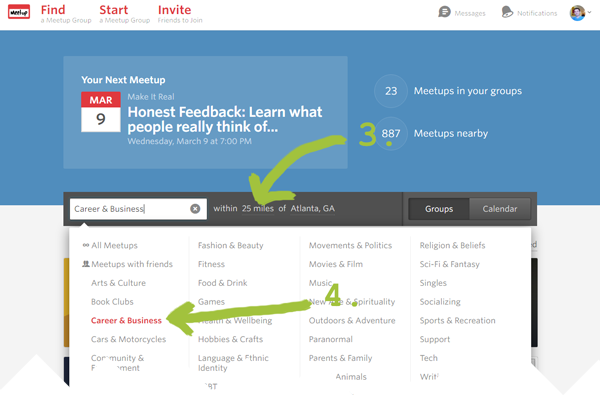
3. Then, change the search radius to 25 miles;and
4. Select “Career & Business” from the drop down menu.
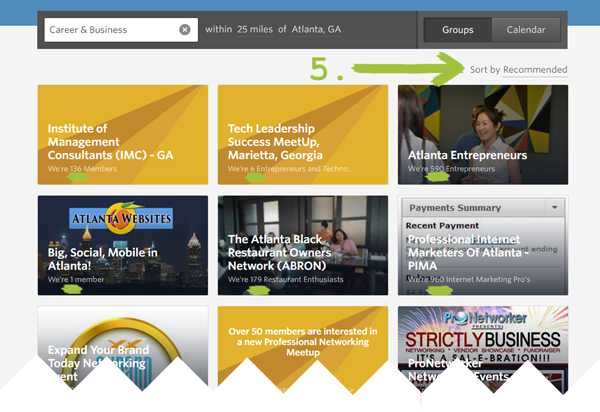
5. Change the “Sort by…” filter to “Recommended”. Unlike other aggregators, Meetup actually does a great job in finding relevant listings for your search queries if you let them recommend groups.
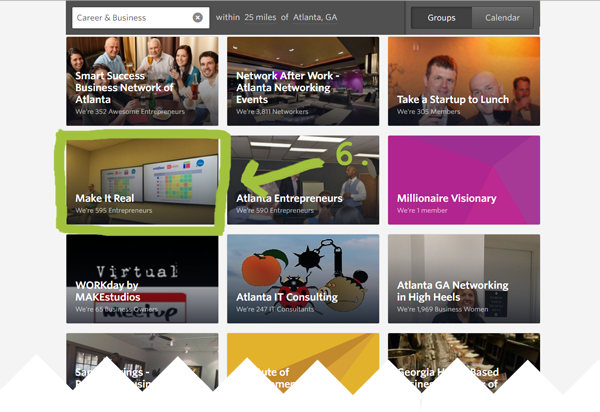
6. Select an event that looks promising from the list of options.
Here’s some quick guidelines to choosing quality events here:
- Make sure that the number of group members reflects the purpose of the group.
- Make sure that the group photo looks somewhat professional.
- Avoid any groups making grandiose and absurd promises (“become a millionaire!” comes to mind).
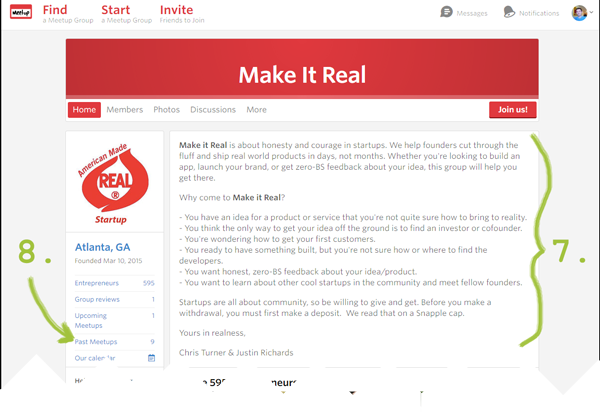
7. Read the description; and
8. Check out the past meetups to verify the legitimacy of the group and see if it makes sense for you to attend.
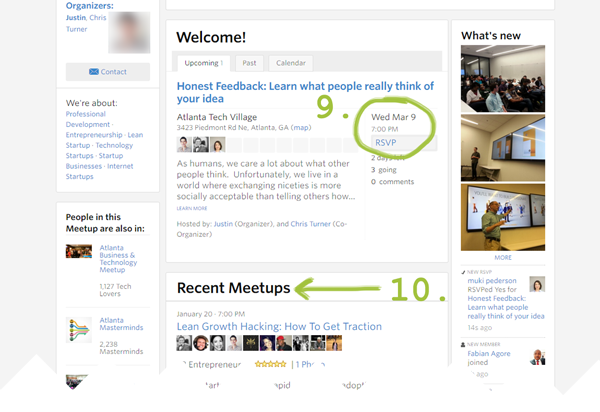
9. Check the date to see if you’re available; and
10. Again, take a look at the most recent meetup (to see if there are any reviews from real people).
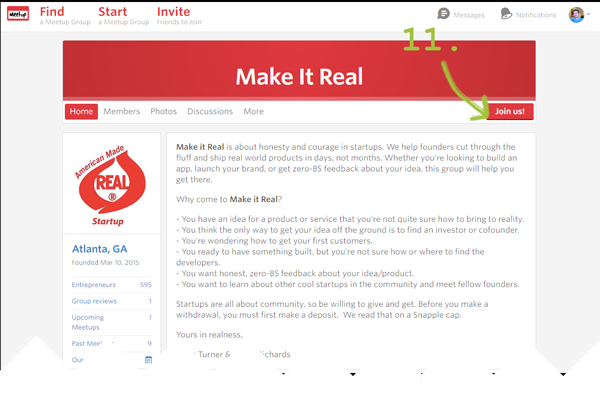
11. If you think that you’d be a good fit with the crowd there, join the meetup!
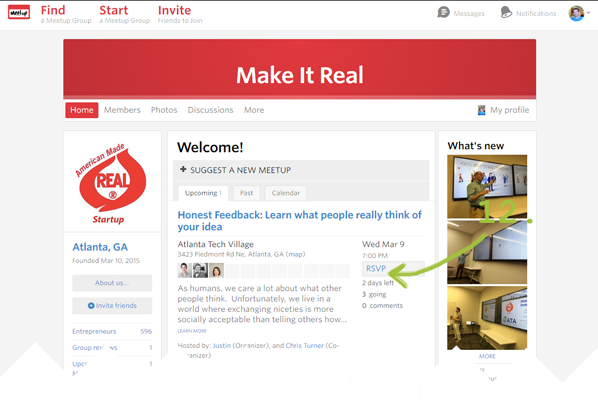
12. You’re not done yet! Remember, Meetup is unique in that you have to join a group before you can attend their events. So, once you are in the group, RSVP to their next event.
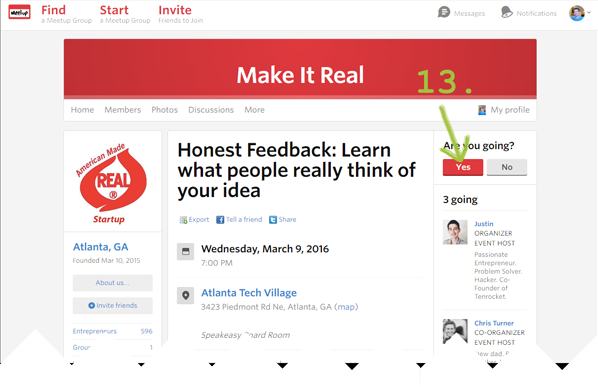
13. Finally, click “Yes” to confirm your RSVP.
Oh, and make sure you download the app to track your events on the go. The app also helps me keep in touch with people I’m trying to reach.
Using EventBrite
EventBrite, much like Meetup, is a very structured resource for finding targeted events.
Keep in mind that Eventbrite doesn’t actually vet the events on their site (and it’s free to create an event), so it’s likely that you’ll find a few events here that we’ll remove later when we comb through them.
Here’s how it’s done:
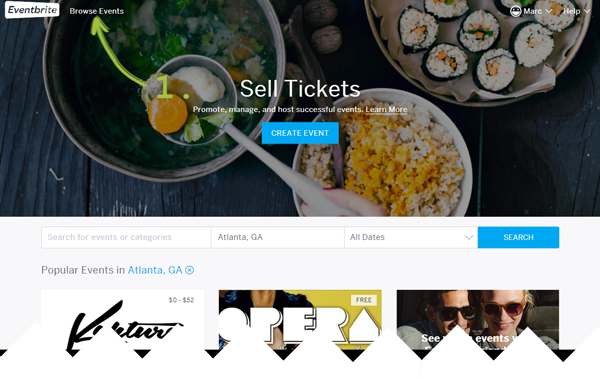
1. After you get to their site, click on the “Browse Events” button.
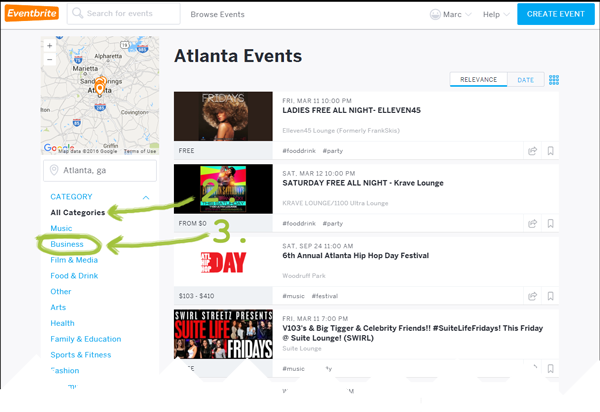
2. After verifying that the location is set to “Atlanta, GA”, Click the “Category” drop down; and
3. Click “Business”.
Note: You may want to also do this with any other niche you want to explore.
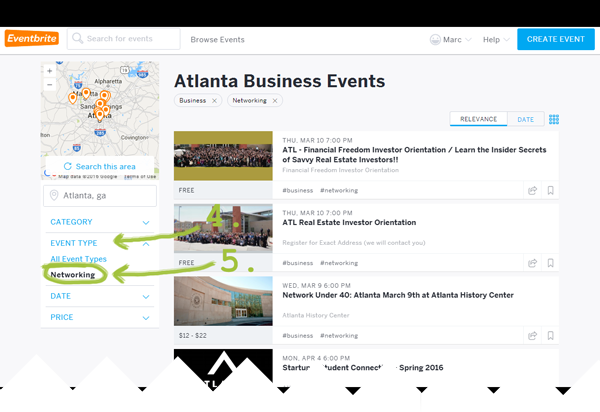
4. Click on the “Event Type” drop down; then
5. Select “Networking”.
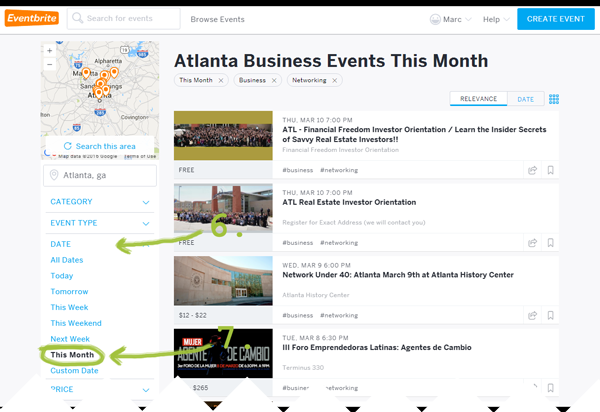
6. Click on the “Date” drop down, then
7. Select “This Month”. Remember, we’re only going to focus on this exclusively for one month!
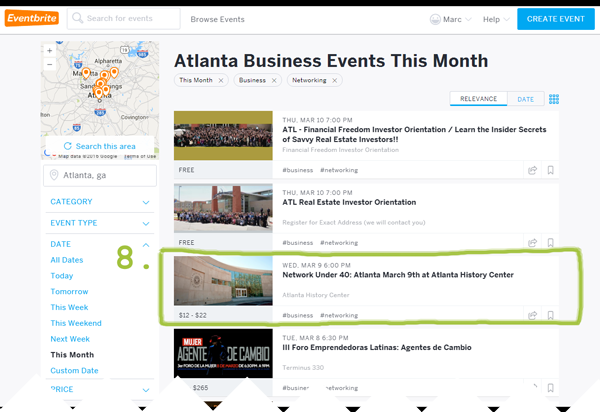
8. Click on an event that looks like it has potential.
You might want to focus exclusively on paid events if you want to attract certain types of customers. Use the criteria from the Meetup section to vet these events, too.
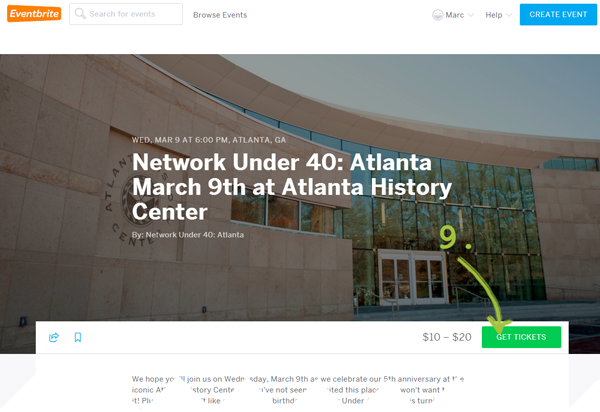
9. Finally, click “Get Tickets” and purchase tickets if you think the event will work for you. Keep in mind that we’re vetting these events later, so you might want to just save the URL for now.
Once again, download the app if you want tickets on the go to save some trees!
| Paid Events
As you were browsing through the event aggregators, you probably saw a bunch of paid events.
Paid events are a very unique type of networking experience, and they’re more valuable to certain businesses than others.
So, should you attend these events? Well, like most decisions in life: it depends on your particular situation.
Essentially, you need to answer these questions:
- Is it financially feasible?
- Does it align with my networking goal?
Remember the cost/benefit exercise we did earlier? Do that again, but factor in the cost of the networking event to the cost of your time. If it’s worth it, go for it!
Also, think back to your networking goal. Do you need to target these kinds of people to achieve that goal?
Remember that the kind of people that attend these expensive events are very specific: they’re business owners that are serious about their growth, and have extra capital to burn on networking events.
If this sounds like it would align with your larger strategic initiatives, then go for it!
Keep in mind that there’s really no way to find paid networking events, they’ll just pop up as you search. For now, add them to your list, we’ll come back and vet them later in this guide.
| Notable Events
I’ve been involved in the local Atlanta networking space for quite some time now. In my time in this space, I’ve accumulated a list of some of the most valuable events in the Atlanta area.
Keep in mind that my niche (technology) won’t necessarily be that relevant to everyone!
Here’s my list:
- The Atlanta Startup Village monthly meeting.
- The Make It Real community.
- The Network Under 40 dine with nine events.
- Much better than their general mixers as you get to build intimate connections with your dinner guests.
Add these to your list if they’re relevant to your business segment!
| Your Chamber of Commerce
I made this it’s own section because it’s such a unique branch of networking that it deserves a quick discussion.
Which chamber should you choose?
There are 2 types of chambers: national and local. You need to decide which one is more appropriate for your business (even if you can afford both, the event load may be too high for multiple chambers, and starting with one lets you focus).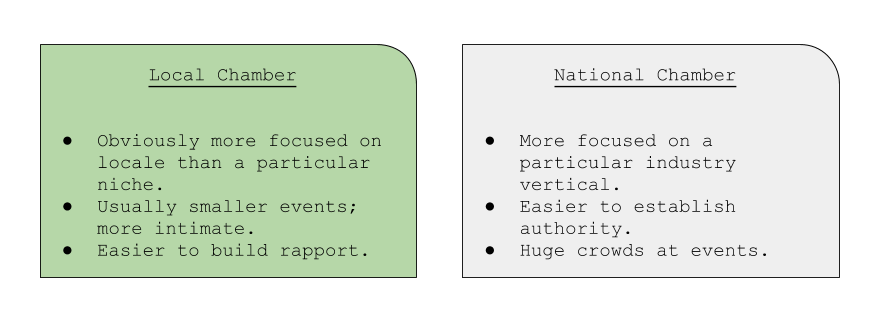
Join a local chamber if local business is part of your primary business value loop (local services like painting, carpet cleaning, etc.).
Join a national chamber if you’re interested in establishing yourself as a thought leader, or if your target demographic is more broadly defined (dentists, lawyers, etc.).
If you opt to go local, you’re still left with figuring out which one to choose. In the past, I’ve simply chosen based on two criteria:
- Which chamber makes sense based on locality for my business?
- Which chamber will be more cost-effective for my business?
Here’s a graph of the common chambers in the Atlanta area and their respective costs:
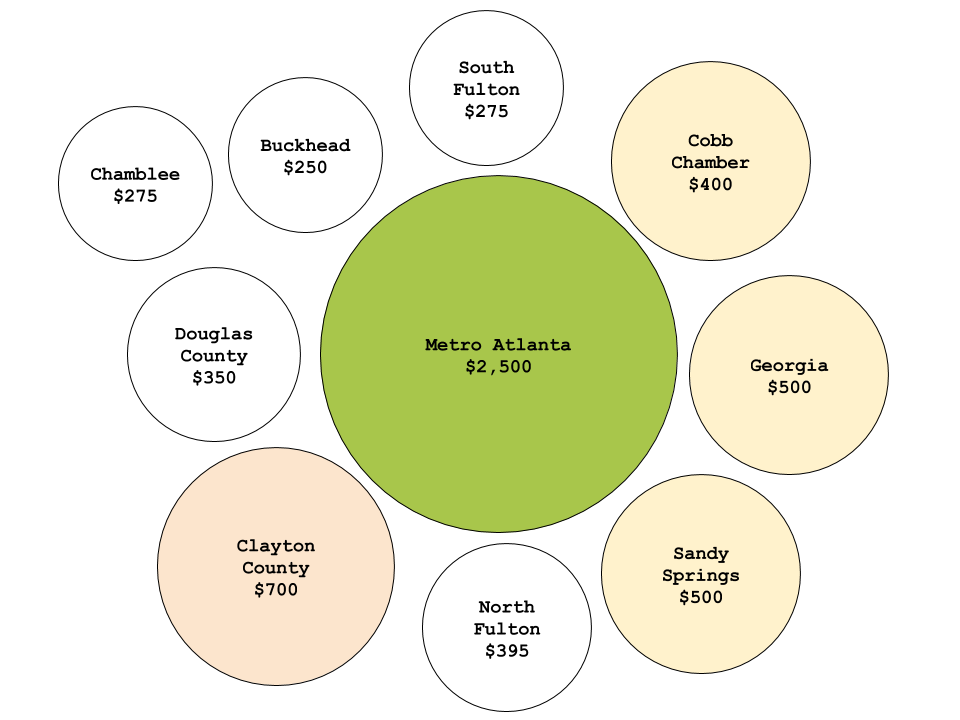
Also, here’s a quick breakdown of all the relevant chambers, the links to their signup pages, and their annual membership costs:
- Metro Atlanta Chamber
- Cost: $2,500 annually
- Clayton County Chamber
- Cost: $700 annually
- Georgia Chamber
- Cost: $500 annually
- Sandy Springs Chamber
- Cost: $500 annually
- Cobb County Chamber
- Cost: $400 annually
- North Fulton County Chamber
- Cost: $395 annually
- Douglas County Chamber
- Cost: $350 annually
- South Fulton County Chamber
- Cost: $275 annually
- Chamblee Chamber
- Cost: $275 annually
- Buckhead Chamber
- Cost: $250 annually
As you can see, the chamber of commerce can get really expensive, so it’s important that you make sure that you choose the right chamber.
For instance, let’s say you really want to do business with business owners in Sandy Springs (you’re a local service operator and it’s too expensive to travel much farther).
Naturally, if the price justified it (remember our risk analysis?), you would invest the $500 annual fee to network in that area.
What Should I Expect?
Chamber events are very similar to other events (and we’ll cover etiquette in the Chapter 5), but you’ll essentially be talking with other business owners who are more or less quite serious about their business.
This is great exposure for anyone who is a B2B service provider, so consider that when making a decision.
Typically, your chamber will host about 4-6 events each month: most of them will be educational, and there will be a single generic monthly mixer event intended to simply bring the community together.
You’ll usually notice a few of the events are sponsored. This can either be a complete waste of time or incredibly key to your overall business strategy depending on who is sponsoring the event.
Oh, and you’ll probably get a link from their directory page which is rather advantageous for SEO (especially if you’re just getting started).
Here’s a quick overview of what we’ve discussed so far:
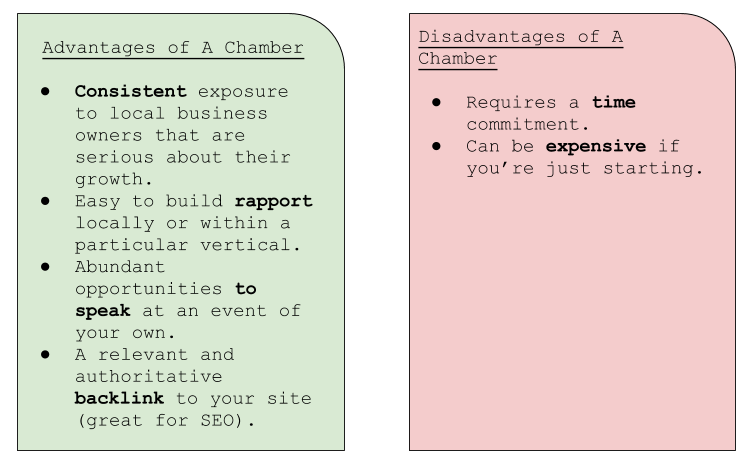
Overall, the chamber of commerce is usually worth it, but the decision is yours to make.
If you opted to check out a local chamber of commerce, go ahead and choose a few chamber events, and add them to your list.
| Conferences & Expos
You’re list is likely getting quite big so far, but fear not! This is the last section before we start filtering through the list and removing events that will provide little value to us.
Before you add any of the events in this section to the list, you need to be sure of 2 things:
- That you’re willing to travel to attend; and
- That you’re willing to attend at some point that may not be strictly within the next 2 months.
Yes, it doesn’t make sense to attend conferences or expos if networking isn’t your primary marketing focus unless there is a relevant local conference happening in the next 2 months.
Let’s use the following search queries, replacing [YOUR NICHE] with your actual niche:
“conference” 2016 [YOUR NICHE]
“expo” 2016 [YOUR NICHE]
Here’s what the query would look like if I was in the dentistry niche:

You’ll see that they are likely not going to be local. This is why I always stress that you should evaluate the feasibility of your conferences before adding them to your list!
Though if you think you’ll get some solid value from these events, add them and we’ll vet them further later.
Filtering Your Events
You probably have at least 30 events in your list now, so let’s filter some of them out. Remember, we’re only focusing on networking for 1-2 months at first so we can find out for sure if it’s right for your business.
As mentioned earlier in this section, there are quite a few “low-quality” events that exists solely to benefit the hosts or some unrelated benefactor.
The goal of this section will be to remove these kinds of events from your list! Let’s get started.
There are 2 kinds of events to avoid:
- Events that are innately unproductive; and
- Events that are misaligned with your networking goal.
So, we’re going to go through each event and vet them for their usefulness to us.
First, we need to understand what we’re looking for though, so let’s tackle the innately unproductive events first. Here’s some guidelines outlining what events to ax from the list:
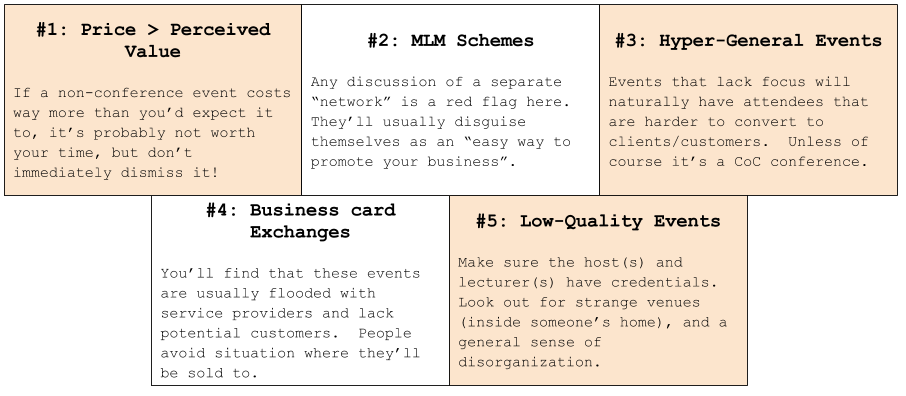
Now, let’s consider the case where the event may be high-quality, but is simply misaligned with your larger business goals:
- Time:
- Does the event occur within the next month?
- Does the event conflict with a more valuable event?
- Location:
- Does the event take place in Atlanta?
- Cost:
- If you’re bootstrapping, attending a $5,000 conference may not be aligned with your larger business goals.
- Goal:
- What is the context of the event? Does this context justify attendance?
- Attendees:
- Who will be at this event? Do you need to get in touch with these people?
Using all the above criteria, here’s an example of a very high-quality event that’s relevant for my web design agency:
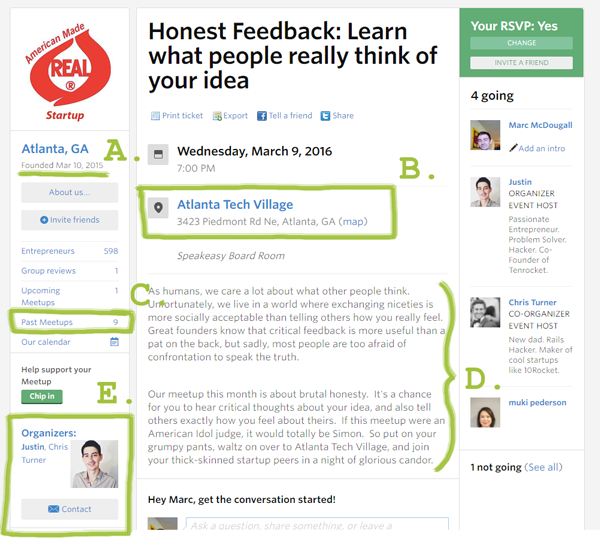
So what makes this event so special? Let’s take a quick look…
- A: Taking a look at their founding date, you can see that they’ve been around for a while – good sign!
- B: I know where this location is, and I’ve been there before. It would be hard for them to get a room there if they weren’t legitimate.
- C: They have a decent meetup history, and I can check past attendee reviews if I’d like to.
- D: After reading their meetup description, it becomes apparent that they’re in this for the right reasons.
- E: The organizers are actually startup owners themselves (relevant to the context of the meetup).
Consequently, here’s an example of one that I would avoid:
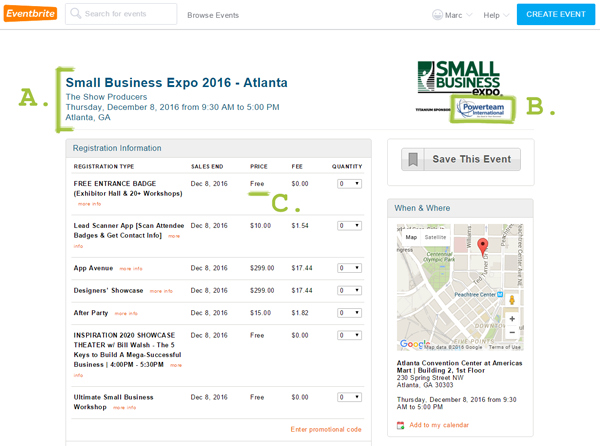
So what’s so bad about this event? It’s very subtle, so we’re going to go into a bit of detail here. First, we’ll examine the high-level information about the event:
- A: Looks like a very professional event! I wonder who “The Show Producers” are…we’ll look into this later. Also, it’s a “small business” expo: hyper-general.
- B: Powerteam International is their “titanium sponsor”? That’s strange, and the word “sponsor” is already a red flag.
- C: Admission is free, so there’s no barrier to entry.
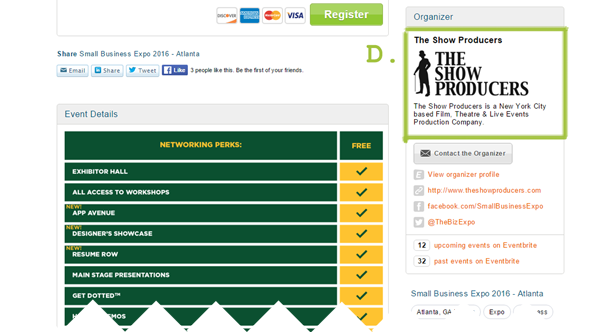
Scrolling a bit farther down the page, we see that we can investigate who “The Show Producers” are. Turns out that they’re legit, but they’re more or less just the logistics guys; they’ll get everything up and running, but the actual beef of the event will be taken care of by someone else.
Who is that? Perhaps it’s our titanium sponsors? We’ll come back to this. First, we’re going to continue scrolling down through the EventBrite page:
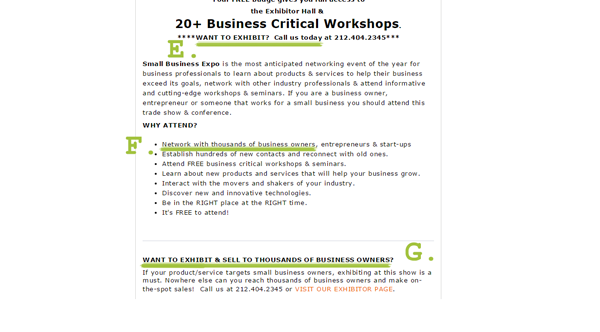
So what’s alarming about this big chunk of text?
- E: Seems like there’s an uncanny emphasis on getting companies to exhibit. This is usually a cash grab by these kinds of conferences.
- F: Thousands of business-owners? They’re prioritizing quantity over quality – any business owner worth their weight knows that this is never a great idea. This tells me that they’re catering to inexperienced business owners.
- G: Again, more emphasis on “selling” to the attendees. People don’t enjoy being sold to, which further confirms my suspicion that this event is focused more on getting inexperienced business owners to invest in an exhibition stall for $2,000 than actually hosting a valuable event.
Again, I’ll be generous. Before jumping to harsh conclusions let’s look at one last metric: who is actually running the show? I wonder if it’s their “titanium sponsor”?
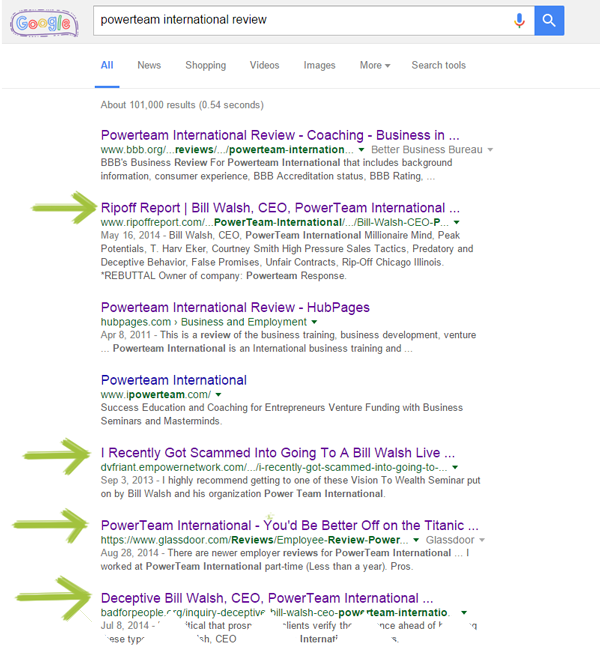
Simply googling the host name with “review” at the end reveals some telling details, but I’ll let you draw your own conclusions. Looks like the first link here is for the Better Business Bureau – surely if there’s any saving grace for this company it will be here:
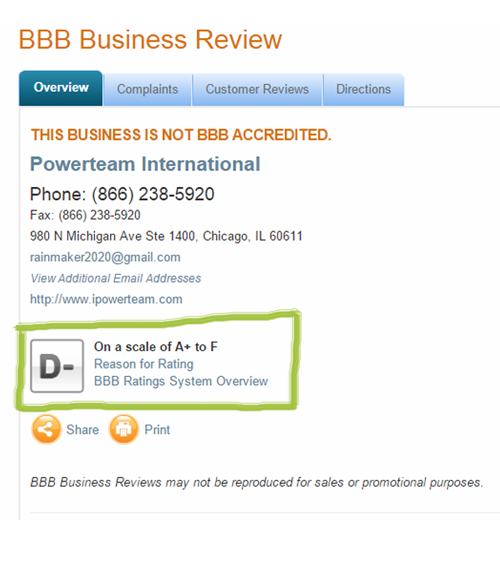
Well then! The second to lowest rating: it’s no wonder these guys were leveraging a production company (The Show Producers) to publicize the event. It just goes to show you that even a tiny bit of research can save you hours of time later.
But at an initial glance, this seemed like a valuable event, how can you repeat this process on your own so you don’t get duped? Just be aware of the following:
- Vet the event hosts and any significant “sponsors”.
- Beware of an excessive focus on requesting payment to “showcase” your business in some way.
- This type of trickery is usually common in those hyper-general events we discussed earlier.
Pruning Your Event List
Call to Action: Go through your list of events and remove those that don’t meet your standards. Try to spend no more than 5 minutes vetting each event!
At this point, you should have 20 targeted, relevant, and valuable events to attend!
Go ahead and RSVP and get them on your calendar.
Now, before we start getting an action plan together for what we’re going to do at the events themselves, I want to cover another section on how to set yourself up for success when you network.
We’re going to discuss how to manage your own events, and it will require a section for itself, so let’s get going!
